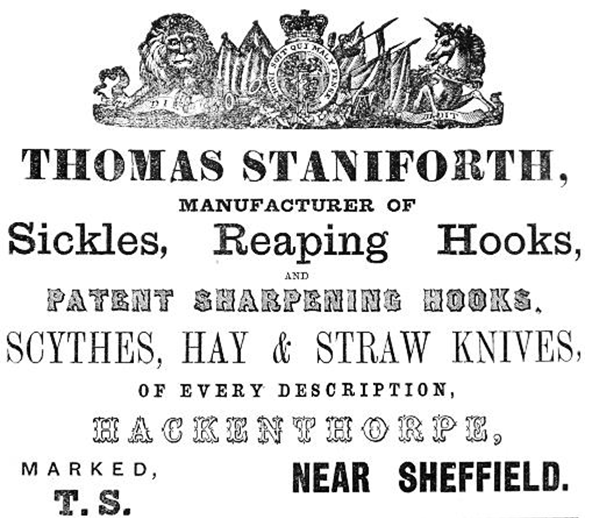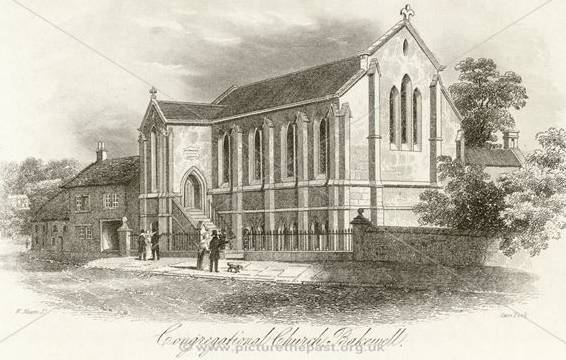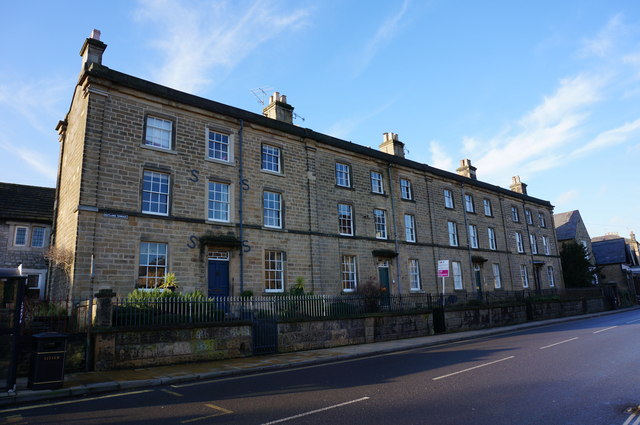
Thomas Staniforth & Co. Sickle works at Hackenthorpe.
 Bakewell Congregational Church c1844
Bakewell Congregational Church c1844
On the 1861 Census, the family are residing at 7 Wellington Square, Salford, the family consists of:
The family is largely unchanged in 1871, Sidney had passed away by this point, dying in 1868, and the Irish servant had been replaced by a Martha A Ogden, from Lancashire.
By 1881, Harry had headed west, now aged 22, he was working as an ‘Officer of Inland Revenue Excise Branch’ and now residing at 5 Newland Street, Werburgh, Derby. He is living as a Lodger with a Francis family, along with two other Inland Revenue officer lodgers, one Frederick W Tyler from Essex and the other Robert W Barwick from Middlesex.
In 1891, Harry had moved into his own residence at Rutland Terrace, Rutland Street, Bakewell. Now 32 years of age, he is described as a ‘Civil Service Inland Revenue Branch 2nd Class Officer’. He is still single, and the sole member of the household.
In 1895, Harry Staniforth marries Mary Elizabeth Bowman at the Friends Meeting House in Matlock.
 Rutland Terrace, Bakewell (Image courtesy of Peter Barr)
Rutland Terrace, Bakewell (Image courtesy of Peter Barr)
Presentation at Bakewell
A large number of members of the Congregational Church at Bakewell, and other friends, assembled in the schoolroom on Monday night to wish God Speed to Mr and Mrs Staniforth on leaving the town, and at the same time to present Mr Staniforth with a handsome music stand in walnut as a token of their esteem. Mr Staniforth has been a prominent member of the Congregational Church during a residence of nearly ten years in the town. He has taken an active part in all movements connected with the church, and as secretary and treasurer, Sunday School teacher, and then superintendent of the Sunday School, has rendered invaluable service. As Excise Officer at Bakewell, Mr Staniforth by his uniform courtesy and kindly manner, gained the respect of the licensed victuallers and others with whom he came into contact in carrying out his duties on behalf of the Inland Revenue authorities. Therefore, when it became known that a presentation was to be made to Mr Staniforth, the licensed victuallers, and, in fact, all classes in the town contributed to the testimonial fund initiated by his friends at the Congressional Church. Mr. A Buxton acted as secretary to the fund and he experienced not the slightest difficulty in obtaining a sufficient sum to purchase a valuable present. At the meeting on Monday night, the Rev. E. Tozer presided, and there were also present: - Mrs Tozer, Mrs Staniforth, Mrs Buxton, Mrs Briddon, Mrs Rose, Mrs Needham, Mrs Frost, Miss Morton, and Messrs J. Bown, S. Wain, C Critchlow, F. Needham, W. Hall, A. Rose, A. Buxton, W. Goodwin, G. Briddon, T. Briddon, T. Bennett, I. Roberts, and others.
The Rev. E. Tozer said they had met there that night to wish Mrs and Mrs Staniforth good-bye and God speed. Mr Staniforth had been in Bakewell a good number of years, he did not exactly know how many, but during that time he had been a most earnest worker, not only in their own church but in every good cause that had arisen in their midst. In their own church, Mr Staniforth had done most noble service. He had thrown himself heart and soul into every movement of their church life. He had never known Mrs Staniforth absent on the day when duty called. At every critical moment he had been there to speak, and to act. To have had Mr Staniforth on their side had not been only a great support, but it had been a pleasure. In all matters concerning the business of the church, he had always found him affable and considerate. He had often differed from him in opinion, but he had ever found his opinions worth considering. He possessed a large amount of sound common-sense. He was a born man of business, straightforward, and very accurate. But they were not drawn towards Mr Staniforth merely because of his undoubted ability. Mr Staniforth had a warm heart. He had proved him to be a true friend – one who regarded friendship as a holy thing, not to be lightly given, nor to be easily withdrawn. He was pre-eminently a man of peace, but he could be a man of battle. He had known him in battle for his friends. He had known him fight for his friends as some men fought for themselves. It was a great grief to him (the speaker_ personally to know Mr Staniforth was ging. He was losing one of his best friends, but he was not the only one who would feel that loss. The church felt it, the Sunday School felt it, and there were many, many friends outside their church who would feel it, not merely the well-to-do, but the poor. The poor of their town, for Mr Staniforth had been a friend to the poor and friendless. They would feel, likewise, the loss of Mrs Staniforth. Although they had not known her for so long as they had known Mr Staniforth they had known her long enough to appreciate her high qualities as a true English woman, gentle and kind in all her dealings. They wished them God speed. He would ask their oldest deacon, Mr Briddon, to say a few words. (Applause.)
Mr Briddon said he had always found Mr Staniforth to be a true friend, especially in sickness. He was exceedingly sorry Mr Staniforth was leaving. He thought they would all be pleased to see Mr Staniforth whenever he returned to the town. Mrs Staniforth had always a smile and a pleasant look, and was cheerful with all who came to their place of worship. He wished them both success.
Mr Buxton said the testimonial was first suggested by men outside their church, and when it was started everyone gave heartily. In losing Mr Staniforth they would be deprived of a man who was a friend to Nonconformity. He said that not only had Dissenters and Churchmen given to the fund, but the trade had been represented and very strongly, in the present they gave Mr Staniforth that night. He called on several publicans and they had given most heartily, and said Mr Staniforth had been very straight in his duty as an Excise Officer. The departure of Mr Staniforth left a great blank on the Congregational Church, a blank which they could not yet estimate, and only time would reveal.
Mr Hall and Mr Citchlow also spoke in eulogistic terms of Mr Staniforth.
The Rev, E, Tozer then made the presentation. He said: Mr Staniforth, we give you this present not as a reward for your sacrifices and your service, God will give your reward. We give it as a slight token of our deep respect and esteem. In giving it, we pray that God will bless you, and send you much prosperity and happiness. The music stand bore the following inscription on a silver plate:
“Presented to H. Staniforth, Esq, as a token of esteem, by the Bakewell Congregational Church and friends, on the occasion of his leaving the town.”
Mr Staniforth, who was visibly affected, said he had not come prepared with any speech. He thought that on that occasion silence would speak louder than words, and also that his heart would be too full to speak what it contained. He was sure, whilst he had been with them in Bakewell, it had been on of the happiest portions of his life. He had been now for nine years with them, and that certainly was a good portion of one’s life, if even one lived to old age. It had always been a joy to him to take part in Christian work. He had held one of the Government appointments at Bakewell, and it had been a duty that was not always pleasant to call on people for taxes. In his duty as an official connected with the Inland Revenue Office, he had always tried to take the right course, whether it met with the disfavour or approval of men. They would understand that the officers who had to look after the raising of the revenue of the country had to do their duty carefully and assiduously. He could testify that his duty as a Revenue Officer in that district had been one of pleasure. He left Bakewell with deep regret, because he had enjoyed going about those beautiful dales and hills. He regretted leaving Bakewell also because he had found so many king-hearted friends in the town. He regretted leaving Bakewell because he had become endeared to that church. He thanked them all most heartily for their kindness in having presented him with that beautiful gift. (Applause)
Light refreshments were then handed round, and the proceedings closed with the Doxology. It should be stated that Mr Staniforth leaves Bakewell, on promotion, for Glasgow.
Although the newspaper notes that Harry was leaving for Glasgow, on the next census in 1901, we find him back in Lancashire. It is not clear if he ever made it to Glasgow, perhaps plans changed at the last minute.
In 1901 he is living at 15 Princess Road, North Manchester, Prestwich, Lancashire, still working as an ‘Inland Revenue Officer’. We also see that his wife was the same age, and from Nottingham. The two also have two children at this time, May Millicent Bowman Staniforth, born August 25, 1897 in Bakewell and Harry Bertram Bowman Staniforth, born in 1901 in Manchester.
In 1911, they are residing at the same address, Harry is now 52 and has been promoted to ‘1st Class Officer Office of Customs and Excise’. His daughter Mary is now 13, and Harry 10.
On the 1939 Register, we find Harry, now a widow, residing at as Ravenstor 211, Buxton Road, High Lane, Cheshire. He is described as being ‘Officer of Customs Excise (Retired)’. He is living with his son Harry Bertram Bowman Staniforth, a ‘Motor Engineer (garage propt)’ and a paid housekeeper named Hannah E Bridge.
Harry passed away on October 12, 1939. His probate records the same address as above: Ravenstor 211, Buxton Road, High Lane, Cheshire. He leaves his effects of £4027 5s. 8d to his son Harry Bertram Bowman Staniforth, garage proprietor. His wife Mary had already passed away a decade earlier, on November 7 1928. Harry is described as being ‘formerly a customs and excise officer’.
His daughter Mary married William R Shaw in 1923 in Salford. She passes away in Chapel En LE Frith in 1972. On the 1939 Register we see them residing at New Tree Cottage, Ack Lane, Cheadle and Gatley, Cheshire.
His son Harry Bertram Bowman Staniforth married Ethel Taylor in 1943. The two had at least three daughters, Rosemary Bowman Staniforth in 1948, Elizabeth M Bowman in 1946 and Penelope Bowman Staniforth in 1943. He passed away on December 7 1960 in Wales.